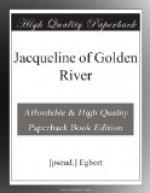I was within three hundred feet of Jacqueline’s home and yet as far away as though leagues divided us. I looked down at the chateau and ground my teeth and swore that I would win her. But all the rest of that day went in fruitless searching.
I must succeed in finding the entrance on the following day, for now Pere Antoine might return at any time, and I knew that he would prove far less tractable here in his own bailiwick than he had been when I defied him at the Frontenac. By hook or by crook I must gain entrance to the valley.
This was to be my last night in the cabin. I could not return, not though I were perishing in the snows.
Happily my eyes were now entirely well, and my hands, though chapped and roughened from the frost-bites, had suffered no permanent injury. So I started out with grim resolution on the sixth morning, when the dawn was only a red streak on the horizon and the stars still lit my way. Before the sun rose I was standing once more outside those two sentinel peaks.
To this point I knew the sleigh had come. But whether it had continued straight down the valley or turned to the right along that same ridge which I had fruitlessly explored before, it was impossible to determine.
I tried to put myself in the position of a man travelling toward the chateau. Which road would I take? How and where would it occur to me to seek an entrance into the heart of those formidable hills?
The more I puzzled and pondered over the difficulty the harder it was to solve.
As I stood, rather weary, balancing myself upon my snow-shoes, I heard a wolf’s howl quite near to me. Raising my head, I saw no wolf, but an Eskimo dog—the very dog I had encountered in New York, Jacqueline’s dog!
CHAPTER XII
UNDER THE MOUNTAINS
The dog was standing on a rock at the base of the hill immediately before me—and calling.
I almost thought that it was calling me.
I took a few steps toward it, and it disappeared immediately, as though alarmed—apparently into the heart of the mountain.
I thought, of course, that it was crouching in a hollow place, or behind a boulder, and would reappear on my approach, but when I reached the spot where it had been it was nowhere to be seen. And the pad-prints ran toward a tiny hole no bigger than the entrance to a fox’s lair—and ended there.
At this spot an enormous boulder lay, almost concealing the burrow. I put my shoulder against it—in the hope of dislodging it sufficiently to enable me to see into the cavity. To my astonishment, at the first touch it rolled into a new position, disclosing a wide natural tunnel in the mountainside, through which a sleigh might have passed easily!
I saw at once the explanation. The boulder was a rocking stone. It must have fallen at some time from the top of the arch, and happened to be so poised that at a touch it could be swung into one of two positions, alternately disclosing and concealing the tunnel in the cliff wall.




